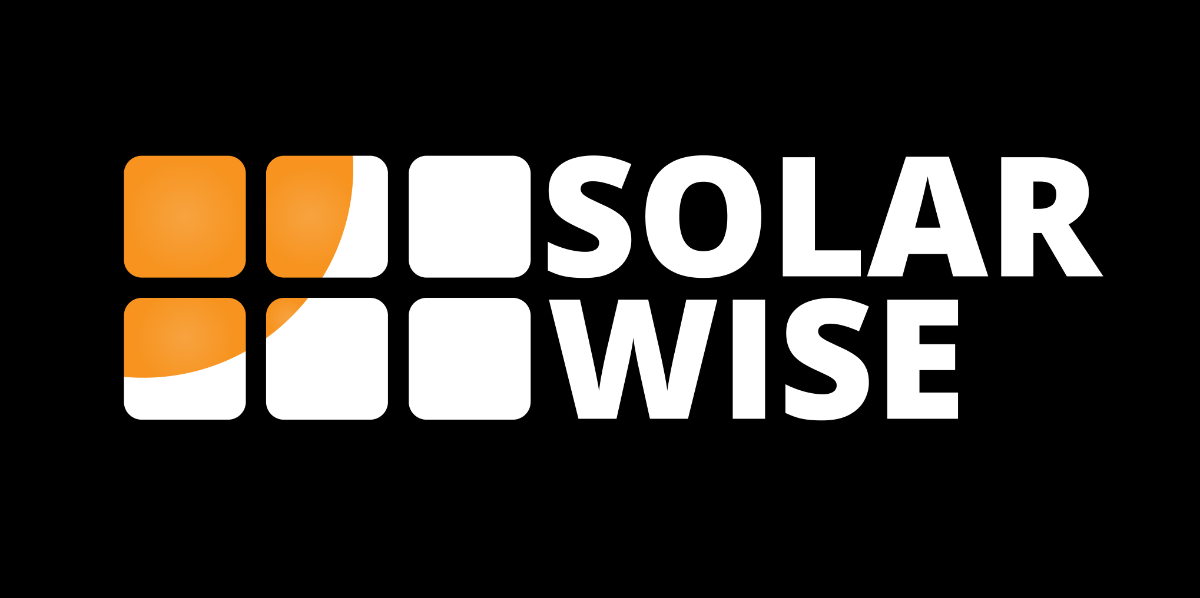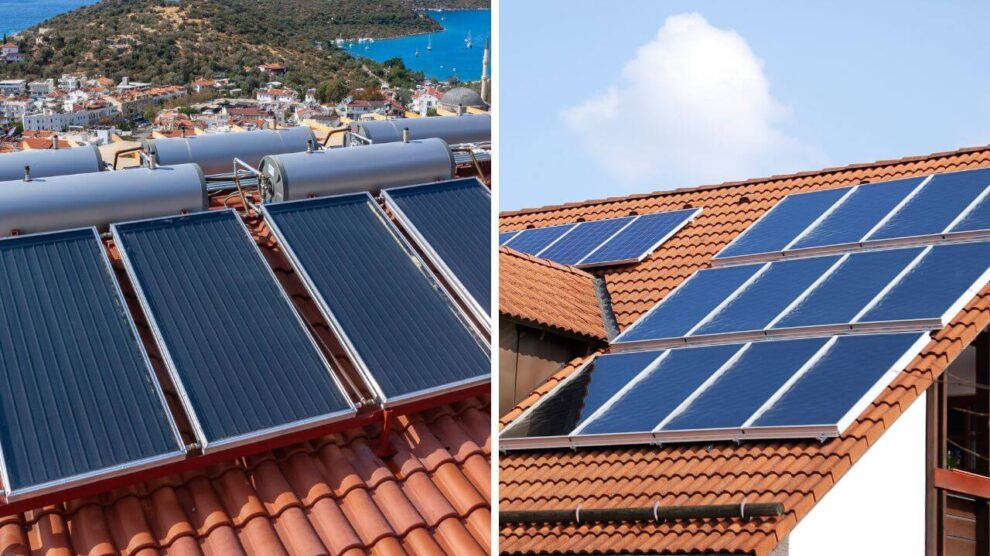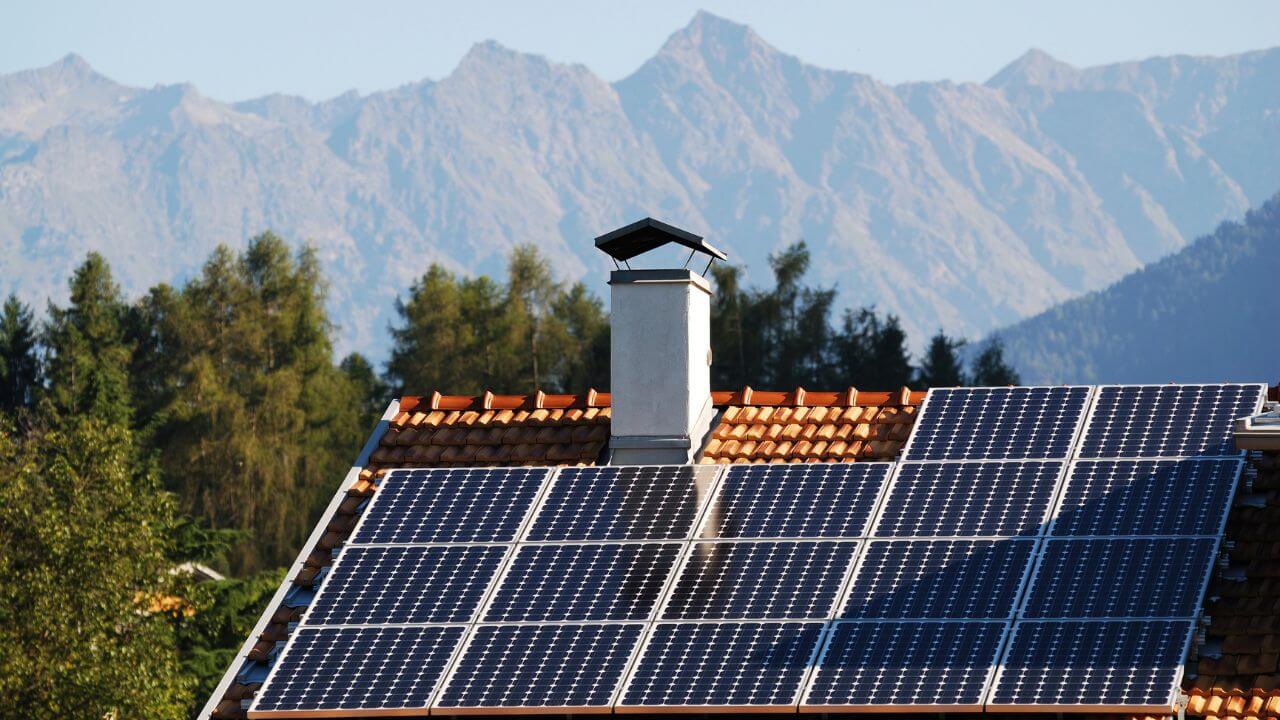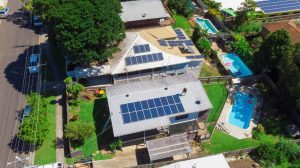Want to tap into the sun’s energy and see a dip in your electricity costs? Both solar panels and solar heating setups offer viable solutions. Which one suits you best, though? Let’s dive into a comparison between the two to aid your decision-making.
Solar panels transform sunlight into electricity, whereas solar heating setups leverage the sun’s warmth to heat water or air. Both have advantages and drawbacks, making it crucial to grasp the distinctions before picking one.
You can generate electricity for your home or business with solar panels. This eco-friendly and sustainable energy alternative can cut back on conventional energy costs, reducing your monthly bills. Conversely, solar heating solutions supply hot water for daily use or warm your living spaces, minimizing the reliance on standard heating methods.
So, if you’re torn between electricity generation or warming water and rooms, this write-up sheds light on pivotal aspects to mull over when choosing between solar panels and solar heating setups. By the time you finish reading, you’ll be well-equipped to pick the best fit for your specific needs.
How solar panels work
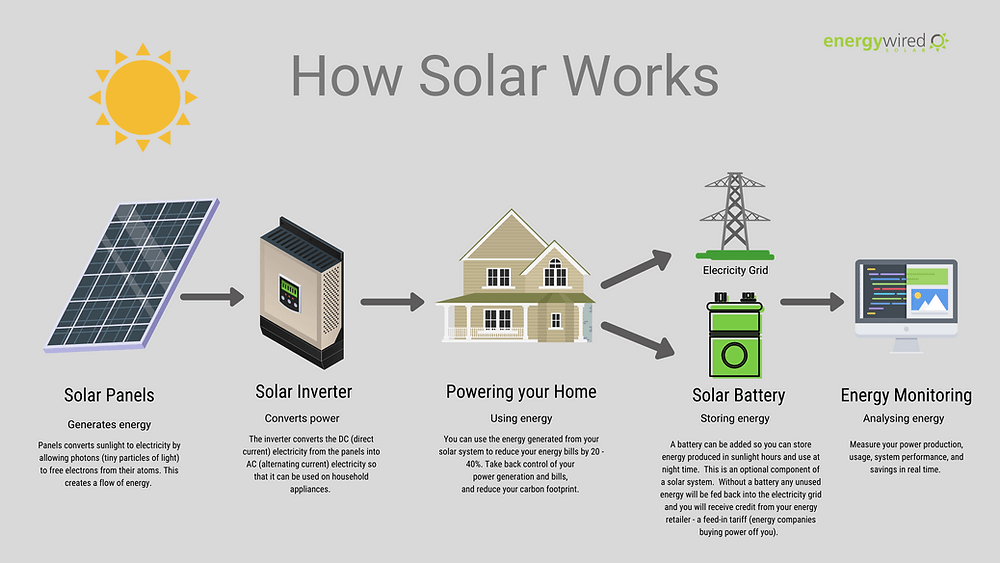
Credit: energywired.com.au
Solar panels, also known as photovoltaic (PV) panels, transform sunlight into functional electricity. Each of these panels houses several solar cells constructed from materials like silicon. The magic starts when sunlight touches these cells, sparking the electrons to move, producing an electric current.
How does this sun-to-electricity conversion work? It’s all about the panels soaking up the sun’s photons. Once they catch these photons, they jostle electrons out of their regular positions, leading to an electric flow. This electricity, initially a direct current (DC), is then switched to an alternating current (AC) using an inverter, ensuring it’s ready for the power grid.
One major perk of solar panels? They’re a source of green and renewable energy. Set them up on your roof or a clear patch of land, and you’re on your way to powering your home or workspace. This move reduces your dependence on non-renewable energy sources, helping you tread lightly on the environment. Plus, you will likely see a dip in your monthly energy bills by creating electricity.
That said, remember that the output of solar panels isn’t constant. Their placement, obstacles casting shadows, and prevailing weather patterns can sway their performance. Therefore, evaluating the sun exposure in your locality is wise to gauge how much energy you can realistically expect to harvest.
Understanding solar heating systems
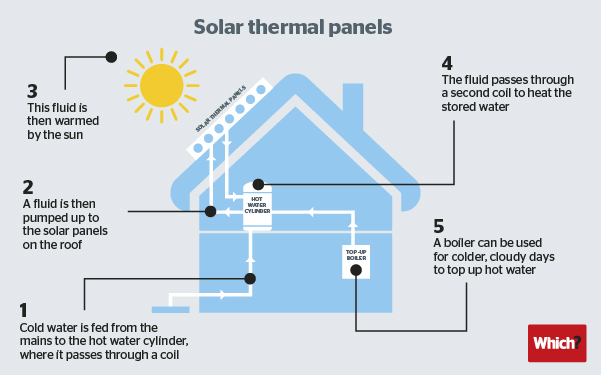
Credit:forevergreen-energy.co.uk
Solar heating setups, often termed solar thermal systems, harness the sun’s warmth to heat either water or air. These systems mainly include solar collectors, storage reservoirs, and a mechanism for distribution. The role of the solar collectors is to snatch the sun’s warmth, passing it onto water or air, which is then put to various uses.
Many households tap into solar water heating systems for their hot water demands. Such setups generally employ flat-plate collectors or evacuated tube collectors. These devices latch onto the sun’s warmth, transferring it to a designated fluid – typically water or a combo of water and antifreeze. This warmed fluid is then directed to a storage reservoir, standing by for everyday needs like showering, doing the laundry, and more.
Beyond just water, solar heating mechanisms also come in handy for heating living spaces. Here, the solar collectors trap the sun’s warmth, passing it to air or a special heat-moving fluid. This heated medium is then piped through systems like radiators or under-the-floor heating elements, making indoor spaces cozy.
One standout advantage of solar heating setups is their knack for offering hot water or ambient space warmth, all while leaning on eco-friendly and renewable solar energy. By channeling the sun’s power, your dependence on age-old, fossil fuel-driven heating solutions decreases. This gives your wallet a breather with reduced energy bills and puts a dent in harmful greenhouse gas emissions.
However, one should bear in mind that these solar heating systems might not deliver optimal results in chillier regions or during sun-scarce durations. Under such conditions, it’s wise to have an alternative heating backup to maintain a steady hot water supply or keep interiors warm.
Comparing solar panels and solar heating systems
Solar panels and solar heating systems harness the sun’s power in different ways and for distinct needs. Let’s break down their differences to give you a clearer picture:
- Purpose: At their core, solar panels are engineered to change sunlight into electricity. Conversely, solar heating systems aim to tap the sun’s warmth to heat water or the air in a space. So, solar panels light up your home or run your business’s machines, solar heating systems supply hot water, or keep your rooms cozy.
- Energy Type: Solar panels churn out electric energy, powering a myriad of gadgets and appliances in your space. Their energy yield is influenced by elements like the system’s capacity, the panels’ positioning, and sunlight availability. In contrast, solar heating systems emit thermal energy dedicated to heating. Their energy production hinges on aspects like system size, collector efficiency, and desired temperature levels.
- Investment and Setup: Usually, the initial investment for solar panels is heftier than that for solar heating systems. The price tag for solar panels is shaped by factors like the system’s scale, panel type, and intricacies of putting them in place. Conversely, solar heating setups tend to be more wallet-friendly at the outset. Their cost is dictated by elements like system size, collector choice, and the heating transfer system’s complexity.
- Space Needs: Solar panels can be relatively space-hungry, especially if you aim to generate a robust electricity supply. The direction they face and their slant are pivotal for maximum output. Solar heating systems, meanwhile, are less demanding space-wise. They majorly consist of solar collectors positioned on rooftops or any sun-soaked spot.
- Upkeep: Regular care is key for solar panels and heating systems to keep them at peak performance. Routine cleaning is essential for solar panels to fend off dirt and other particles that could hamper their effectiveness. As for solar heating setups, maintenance might entail fluid level checks, scouting for collector leaks, and ensuring the heat distribution mechanism is up to snuff.
While both systems offer sustainable solutions by tapping into solar energy, your choice should reflect your primary needs: electricity generation or heating.
Factors to consider when choosing between solar panels and solar heating systems
Choosing between solar panels and solar heating systems can seem challenging, but weighing certain factors clarifies the decision. Here’s a simplified guide to aid in your selection:
- Your Energy Demands: Start by gauging your primary energy necessities. If curbing electricity expenses is your primary concern, solar panels might be the way to go. However, if hot water or warming your space ranks higher on your list, a solar heating setup seems more apt.
- Space Availability: Examine the space you can spare. Given their design, solar panels often call for a more extensive spread, whereas solar heating systems are more compact. Reflect on whether your roof or any open area on your property can comfortably accommodate the system you’re eyeing.
- Local Sun and Weather Patterns: Review your locality’s regular sunlight and overall climatic conditions. Solar panels thrive best with abundant direct sunlight. If your region is often cloudy or has shorter daylight hours, solar panels might not churn out electricity as efficiently. Meanwhile, solar heating systems can still hold their ground and offer warmth, even if sunlight isn’t always abundant.
- Budget and financial incentives: Reflect on your budgetary constraints and look into any governmental or local incentives for going solar. Although solar panels might seem pricier at first glance, incentives or rebates could lessen the financial strain. Solar heating installations, in general, tend to be lighter on the wallet upfront.
- Long-term goals: Ponder over your broader, long-term aspirations, especially concerning sustainability. Solar panels can significantly reduce your dependency on conventional electricity sources, leading to a smaller carbon footprint. On the other hand, solar heating systems can steer you away from traditional, often non-renewable heating methods, marking another step towards an eco-friendly future.
Armed with these insights, you’re better positioned to discern whether solar panels or solar heating systems align more closely with your energy and sustainability objectives.
Final Thoughts: Solar Panels versus Solar Heating Systems
As we conclude our discussion of solar panels versus solar heating systems, it becomes clear that each presents distinct advantages. Solar panels, centered around electricity generation, offer an avenue to mitigate electricity costs and adopt a greener, more sustainable energy mode. Conversely, with their warmth-centric design, solar heating systems capture the sun’s radiant energy to ensure cozy homes and hot water, adding a touch of luxury to those cold mornings.
Your ultimate selection between these two will mostly hinge on your individual requirements. If trimming down electricity expenses and gravitating towards renewable energy resonates with you, solar panels may be the way forward. Conversely, solar heating systems might be the answer if your priority lies in maintaining warmth, whether it’s for your living spaces or your showers, and primarily if you’re situated in a cooler locale.
It’s essential to note that it’s not a strict either-or scenario. Many homeowners discover that marrying the strengths of both systems yields the most holistic, energy-efficient, and comforting outcomes. No matter your choice, by embracing solar technology, you’re championing a future that’s brighter, cleaner, and more in harmony with our planet.
